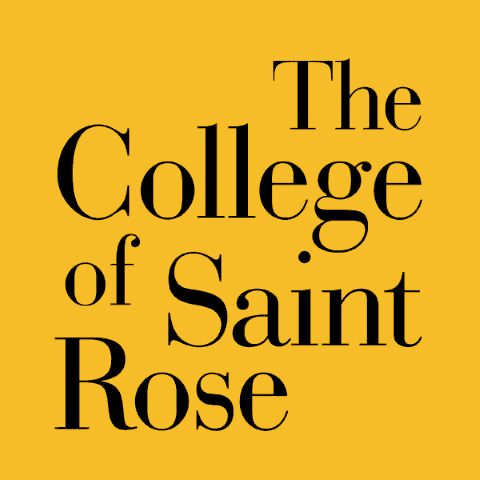When she enrolled in a Saint Rose graduate program, Sharon Edwards-Grant wasn’t just aware of the value of combining academics and work. She had lived it.
Edwards-Grant had visited colleges and universities nationwide to recruit students for highly-specialized positions – while earning her undergraduate degree at Northeastern University. She pursued her Saint Rose master’s degree in higher education leadership and administration while serving as internship coordinator with the College’s Huether School of Business.
“What I’ve found is having the work experience makes the study so much easier because you can truly apply your practical and academic knowledge,” said Edwards-Grant, who earned her graduate degree in 2021. “When students can connect their academics to something practical they’re more engaged.”
Now, as new director of the Saint Rose Career Center, she helps students across the disciplines consider their futures, while exploring their academics. It’s a job serving four constituencies: undergraduate and graduate students, alumni, and employers.
Jamaican-born, Edwards-Grant came to the U.S. in 1980. After working for Hilton Hotels Corporation, she joined British energy research company Wood Mackenzie, spending 19 years and rising to director of human resources. In that capacity, she recruited college students for jobs in energy research. Higher education has captivated her ever since.
Here, she discusses her experiences and plans:
Describe your approach to your career and work with students.
I must be intellectually stimulated and curious, with a take-charge mentality. That said, I take a pragmatic approach before jumping into action. My family says I’m a silent Type A; always in action, constantly considerate of others, but I try not to overwhelm them.
Describe your move from the corporate world to higher education.
I did an analysis of my skills, knowledge, and passion. All signs led to education. I had a keen desire to learn about the landscape of higher education, so I enrolled into the graduate certificate higher education administration program at Northeastern University. This was my way of testing the field before matriculating into the master’s program.
While completing the certificate, I volunteered with Albany schools, which led me to work with the (city’s) summer youth employment program. Saint Rose was one of the sites for our enrichment sessions. While there, I saw a sign for higher education administration and leadership, and said, “I’d like to do that.”
How did the degree prepare you to work in higher education?
Having had years of practical experience, connecting the academics was seamless. We covered all components of higher education administration; finance, how students/ people learn, quality control, accreditation, enrollment management.
My capstone paper was on the skill and knowledge deficit employers are experiencing. Employers are finding 45 to 50%, in some cases higher, of recent graduates (two-year and four-year colleges) lack the knowledge and skills to be competitive in today’s workforce.
Students must be articulate, especially in English, communications, writing, analytical and critical thinking, coupled with their STEM and business education.
You were also internship coordinator. Describe both studying and working in higher education.
I can really empathize and know exactly what our students are going through. I gained and shared study tips and ways to articulate, in writing and verbally, the knowledge they gained from their respective courses.
All signs point to career preparedness playing a bigger role at colleges, right?
Yes. Students need to be able to market themselves with confidence. Every business needs contributors with strong communication skills, who can think critically and assess and break down information, regardless of the field.
Students are so bombarded by social media, world events, and family issues, a large percentage just are not thinking about their futures while at college. This is not just a Saint Rose. It’s nationwide; I would argue, global.
So, career centers are more than places to drop by once in four years.
Speaking from my own experience, most students see career centers as an after-thought or reactive measure. They get there when they get there.
My goal is to see the Career Center operate with efficiency and pro-activeness, with a laser focus on employment; professional development through internships, jobs, and graduate school. We see this space demonstrating aspects of a high-performing, results-oriented executive employment agency.
How?
When I became interim director in December, we already had an established pipeline of employers. There were good practices in place, coupled with good internship and student placements for various academic majors, such as, education, business, and psychology. However, we need to ensure all majors are as well served.
The plan is scale up our offerings. Preferably, we will have classrooms where employers and students meet, and where I can instruct 10 or 15 students on practical career education, versus one student at a time.
One of our obstacles is lack of awareness of our services. We are working diligently to improve the situation starting with fall semester.
You are also bringing career services to the classroom, right?
Yes, professors have invited us to their classrooms, in-person, and virtual. The goal is to work with professors and internship coordinators from each school to ensure all students are involved in career education and positioned for internships and job opportunities.
What about the poetry or philosophy student, or someone immersed in learning who is not necessarily considering a corporate or business career?
Each student and career counselor has a conversation and questions are asked: What’s your passion? Where would you like to see your passion meet your purpose? We do an assessment to identify strengths and gaps. We review all the courses the student has completed in the degree program to date, and I ask what skills and knowledge they have gained.
The economy demands it. Not everyone will be a teacher or in the corporate world. But all students need to package what their professors are teaching to make them marketable.
How will this work?
We want them to have a connection from day one and then start pursuing experiential opportunities from sophomore year, contingent on the student’s readiness. Employers are hiring from their internship program – the main reason why companies invest in interns. The goal is for our students to have at least one internship, shadowing, or externship opportunity by sophomore year to build their resume with meaningful practical experience gained from these assignments.
A 10- or 12-week internship is 10 or 12 weeks of ongoing assessing of knowledge, skills, and abilities, plus work ethic. Based on the level of performance, an intern will be asked to return as a level 2 intern, or given a job offer to return post-graduation.
Our goal is for our students to secure employment or be accepted to graduate school upon graduation.
What else?
We now have on-campus college wide internship and job fairs for all four schools. Our fall fair is September 21. In addition, we will offer career-related events throughout the school year, collaborating with employers and major-specific experts and recruiters.
What about prospective employers?
Right now, we have close to 200 employers who post job opportunities with us and a core of approximately 45 employers who participate in our career events. We will be actively working to increase our base through strategic partnerships and initiatives with employers within the Capital Region and beyond.
How can we help?
Help by promoting our Career Center initiatives, programs, and events, and sending along internship and job opportunities! We also value recommendations of major-specific experts willing to share their knowledge to our students. Please send suggestions to career@strose.edu, or jobs@strose.edu.




Comments posted on this site are held in moderation until approved by a site administrator. Vulgar, profane, obscene, offensive terms or personal attacks will not be tolerated.